"I'm going to continue my husband's work". The widow of a fallen border guard decided to mobilize
The editorial office learned about Svitlana Trubachova's decision on the day this article was published. The article describes what preceded her decision to sign a contract with the Armed Forces of Ukraine and how she approached it through volunteering and involvement in the affairs of the unit in which her husband fought and died in the first days of the Great War. "I'm going to serve, to continue my husband's work," she told us.
An ordinary electronics store in Kyiv. There are cell phone and laptop accessories on display and a small queue inside. Meanwhile, the seller is packing a case with a drone into a large box: a woman in a black jumpsuit with long hair is trying to buy two Mavics. She only has enough cash for one. Due to a power outage, she was unable to withdraw the required amount from her card. She pays for the second one with her card: the store gave her a discount on the commission charged to the customer's card for this purchase. The woman breathes out a sigh of relief: "It's people's money, and it's so hard to save it, I can't spend it on commission," she explains.
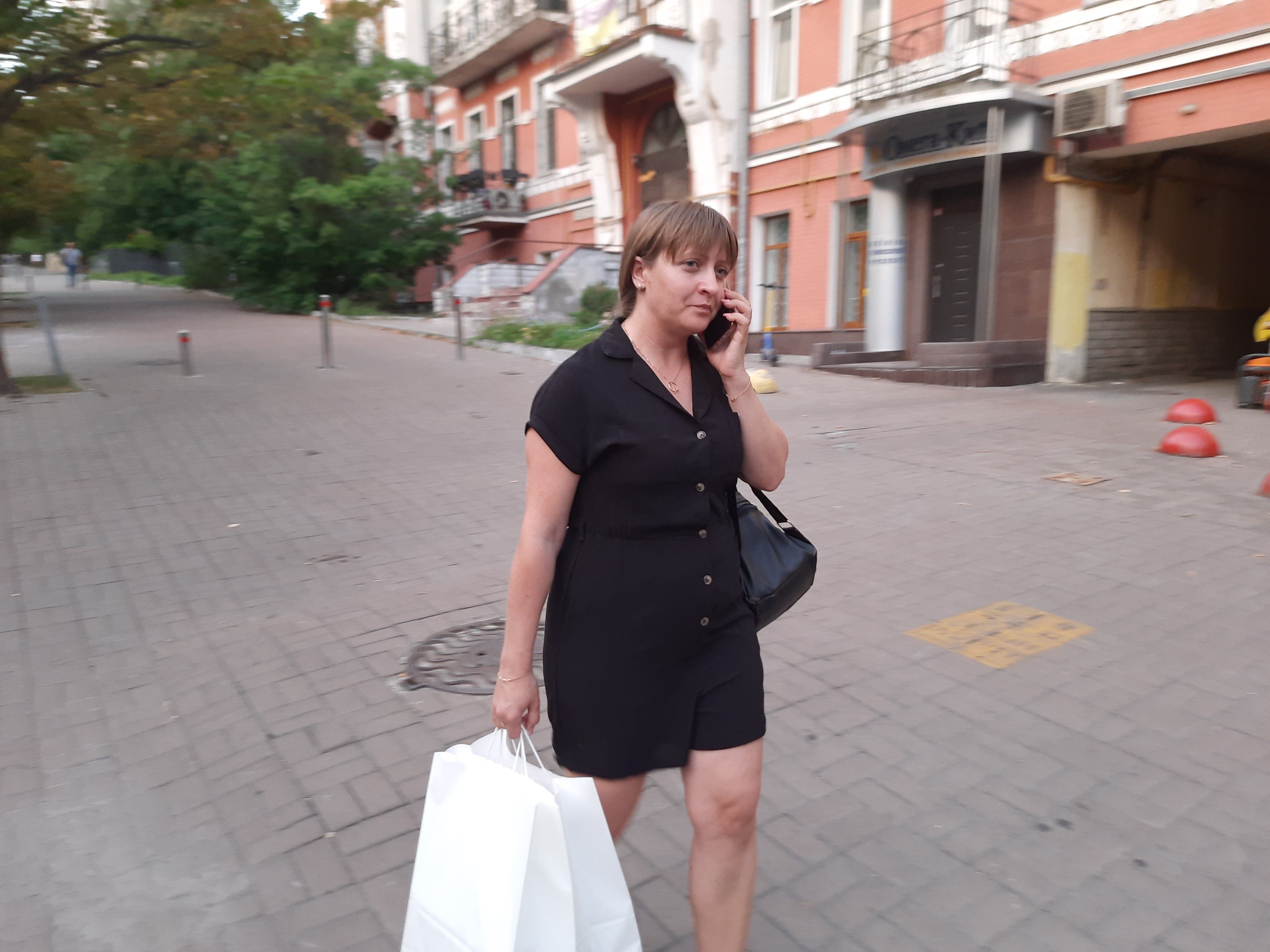
Wedding ring
This is Svitlana Trubachova. She lost her husband in the spring of 2022. Now, she organizes fundraisers and buys drones for border guards, her husband's comrades-in-arms.
While Svitlana was dealing with the Mavic, the power went out at home again. We sit in the semi-darkness of the kitchen, lit by a flashlight. The children are playing in the room under the garland. At 12, Ihor is already a head taller than his mother. He wears two bracelets on his arm, one blue and one yellow. Polina started school this year and loves to dress up nicely.
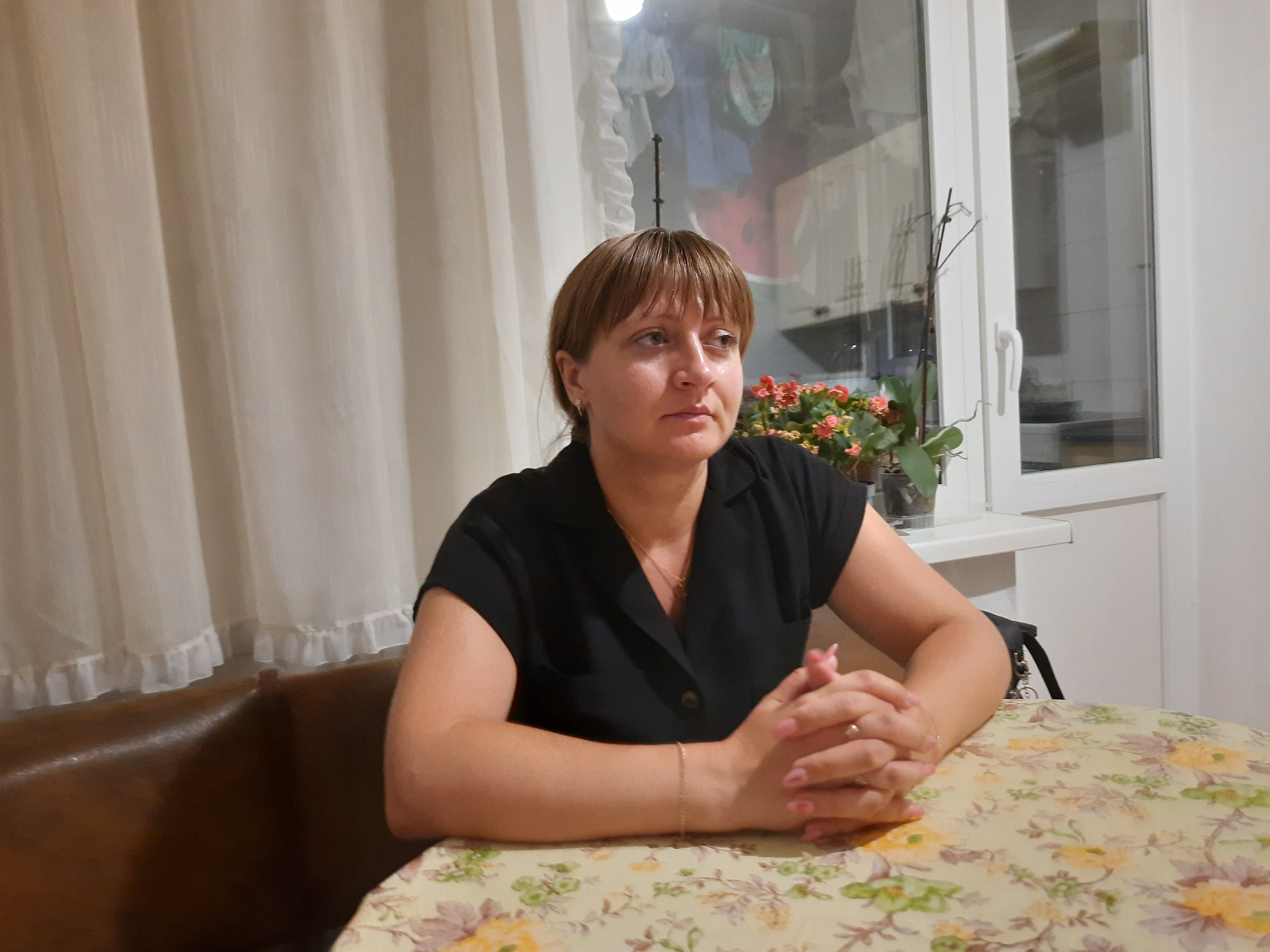
Svitlana has a chain with her husband's wedding ring around her neck. When anxious, she twists the jewelry with her fingers and feels her husband's support.
They met Volodymyr by chance. He was a border guard, and she lived in a village 30 kilometers from the outpost. Back then, border guards were given corporate SIM cards with numbers that differed by only a few digits. Svitlana was calling someone close to her, but she made a mistake. In the evening, Volodymyr called back. They talked on the phone for two months, then met. Four months later, they got married. They bought a house in Troitske, Luhansk Oblast, and lived their happy life.
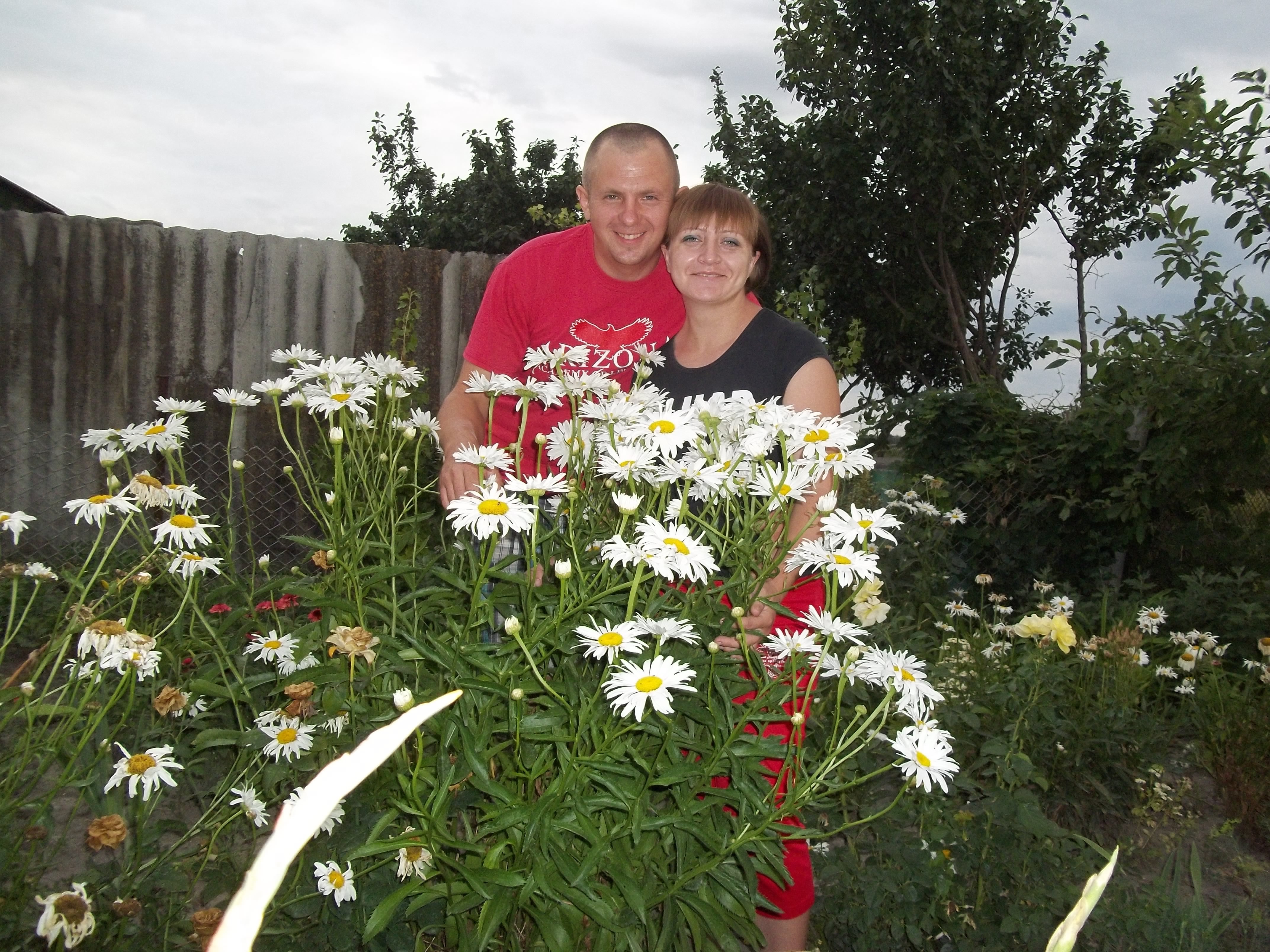
Svitlana says that in their 15 years of marriage, they have never had a fight. They discussed everything and supported each other. When her husband was repairing something in the garage, Svitlana could just sit and admire him. She says she felt like she was behind a stone wall. He always organized everything: to get a certificate or to go to the seaside.
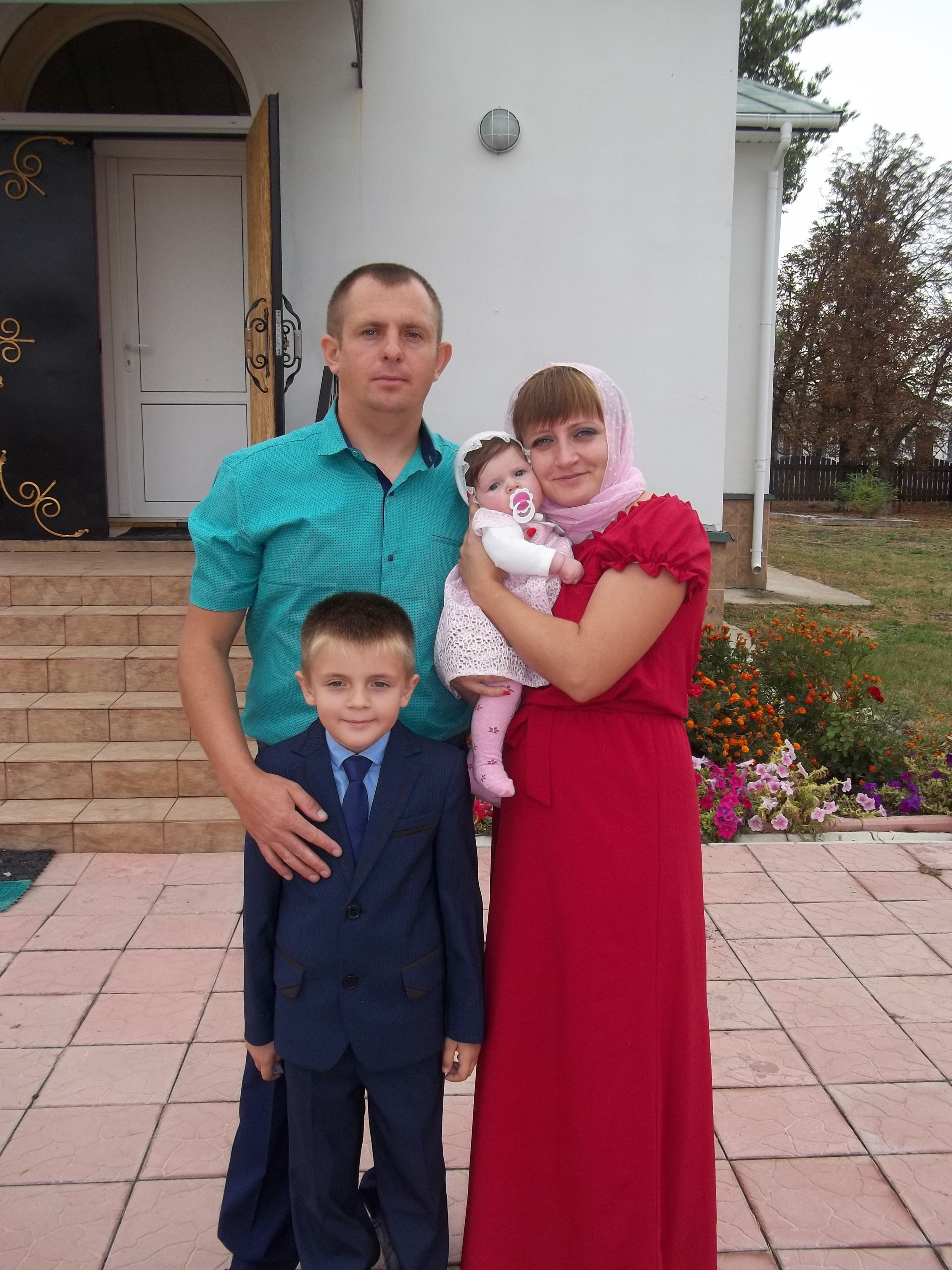
The invasion
Troitske was occupied in early March 2022. Volodymyr was on duty. And Svitlana was running around the village in a panic, sometimes five kilometers away, to catch a connection. She says she did not write messages to her husband but whole letters. It was important to him because many people in the village had turned their backs on those who remained loyal to Ukraine. Some relatives and neighbors were simply afraid to keep in touch, and some went over to the enemy.
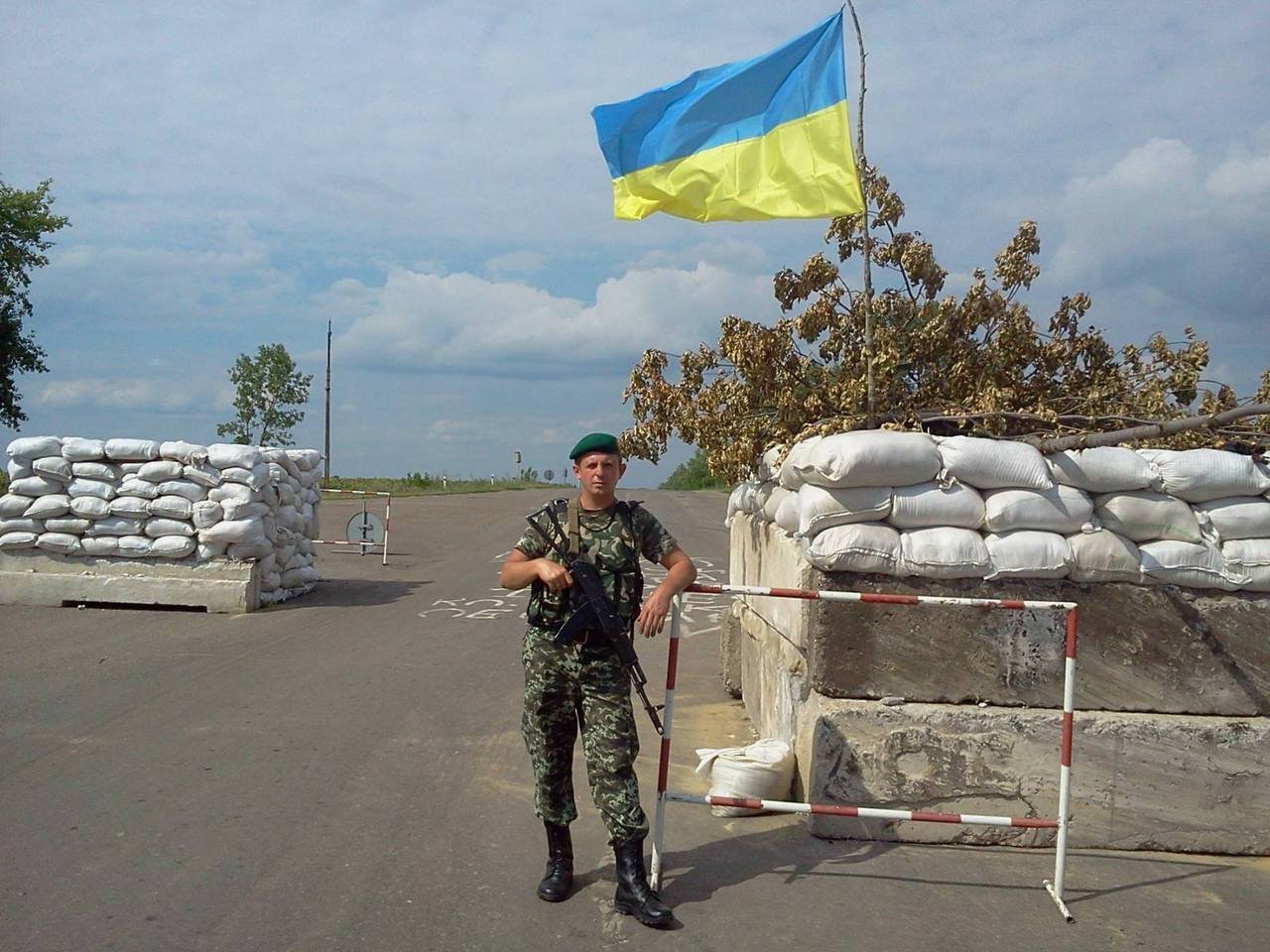
"He kept me calm, and I kept him calm. While we were talking, I heard explosions somewhere behind us, and he said it was calm. He was afraid that I would not be touched, so I told him that I was not."
Occupation
The Russians came to Svitlana's house prepared with documents about Volodymyr's years of service, his positions, the SBU, etc. They knew everything about their family.
It was a real pleasure for the occupiers to interrogate the wife of a Ukrainian soldier, and they destroyed all Ukrainian symbols in the house: they burned books, embroidered shirts, flags, and her husband's civilian and military clothes. Polina's three-year-old daughter grabbed her father's cap and did not want to give it back, but they tore the headdress from her hands, ignoring her screams, and threw it into the fire.
"It was unbearable. When you're afraid to fall asleep because they could come with knives and machine guns at any moment. And you realize that there is no police, no ambulance, no communication, and no internet. You can't ask for help because no one will come. The villagers would come to the house when the Russians came, they were curious, a whole crowd would gather. But no one ever came to the house. The Russians left, and they left too."
Life stopped
The most challenging day of the occupation was the 50th day of the great war. The day Svitlana received the news of her husband's death. It seemed as if life had stopped. It was impossible to leave the occupation for the funeral. His comrades buried Volodymyr in arms at the cemetery in Dnipro.
Svitlana had to hold back a lot of tears so that her children would not see. To relieve herself, she chopped wood.
"I would go out, take an ax, and just chop wood. I chopped until I had the strength. My anger and fear all came out."
Svitlana hoped that after her husband's death, the occupiers would leave her alone. However, things only got worse. She was taken for interrogation at the commandant's office, and her children were locked in the house alone. Svitlana didn't know whether she would return or not. She was shown denunciations from her fellow villagers, who wrote that she was a coordinator of the Armed Forces of Ukraine.
But she endured, gathered her courage, and began planning her departure. She says that her husband's will helped her psychologically to escape the occupation. Four days before he died, he asked that if something happened to him, she raise his children to be good people.
She sold her car to leave
When Svitlana started packing and took out her suitcase, little Polinka thought they were going to the sea and that her father would meet them there. She packed her swimsuit in the suitcase, and her mother used hot glue to seal her husband's UBD ID card in the grommets and folded the embroidered shirts to look like simple white shirts, hoping that they would not be noticed during searches.
It was possible to leave Troitske only by private transport, the railroad was destroyed in the first days of the invasion. Locals organized a "business". They were charging five thousand hryvnias per person to take them to the border with the government-controlled territory.
"It seems like a little money, but there was nowhere to get it during the occupation. I sold my car for five thousand hryvnias. I sold a lot of things back then. The Russians were scaring the locals that there would be no hryvnia tomorrow, so everyone was trying to sell the money somewhere and buy something with it."
Driving through 15 enemy checkpoints is like playing a lottery. The chances are 50-50: either you get there, or you don't. They were lucky. On the border with the Kharkiv region, they were met by the Armed Forces of Ukraine, who took them to Kharkiv. In Kharkiv, Svitlana and her children came under air strikes. They were hiding in a bomb shelter and couldn't poke their noses outside. The woman caught herself thinking that she had gone from one hell to another. The military helped them get to Dnipro.
The cemetery in Dnipro
There, the family visited the graves of their father and husband for the first time. Little Polinka visited the cemetery for the first time in her life. There were many blue and yellow flags. She jumped for joy and exclaimed: "Ukraine! Hurrah! We are in Ukraine!". And when she saw her father's grave, she asked: "Is this my dad's house?"
And Svitlana just lay down on the grave and stayed there for four hours, exhausted. A volunteer, Maxim, was with the children then and later took the family to the train station. The woman was confused and did not know what to do next. She had no relatives or friends. It seemed that they were alone in the whole world. At the moment of greatest hopelessness, the phone rang. It was her husband's colleague, a border guard from Kyiv, who had served for some time in Troitske and was organizing Svitlana's husband's funeral.
- "Where are you?" she asked.
- "Nowhere," Svitlana answered, confused. "We are sitting at the train station.
- Come to my place," the woman immediately offered.
She met Svitlana and her children and settled them in a village in the Kyiv region. Every day, Svitlana went to Kyiv to fill out documents.
"It was so hard to get that pension for the children. When you come from a region that doesn't exist, you have to prove all the time who you are, whose wife you are, that your husband was a soldier. It was only thanks to the help of the Border Guard Service that we finally managed to get those documents drawn up."
Life in Kyiv
In Kyiv, Polina was terrified of the subway. When she heard a train approaching, she would fall to the floor and cover her ears with her hands because she thought it was a bombing plane. Svitlana started looking for psychologists. One day, she met the head of a correctional center for children with autism spectrum disorders, who offered the help of her specialists. In addition, the family could live in the center for a while. The room where the children used to study became a temporary home. They slept on mattresses on the floor, and people helped as much as they could.
"I used to stand in line for food rations in someone else's clothes, wearing a black headscarf. And I remember that not long ago, I had the best husband in the world, my own house, a flower garden, and two cars, and today, I have nothing left."
Then Svitlana was offered to go boxing with her children. The first time she went, she lay on the floor and cried: "In addition to hurting my soul, you made my body hurt too." But then she liked it, and for almost a year, they trained together until the coach left.
Children
Then, Svitlana asked to work with children in the center where they lived.
"On September 1, 2022, the first groups for children with autistic disorders began to open. I started going for a walk with these children. I felt so sorry for them. I wanted to share my warmth. People around me gave me so much care that I already needed to share it with someone."
Now, she is a teacher in a correctional group. She says that the children are like her family, and she even took a child home to spend the night when her mother was hospitalized, and there was no one to pick her up from the kindergarten.
Svitlana has enrolled in a psychology program, is taking certified courses in working with children, and is studying at a driving school. She hopes that the new knowledge will help her in her work and personally. She says she has had 15 psychologists. And none of them helped.
"I was looking for a magic pill. I thought I would get help right now. But this is impossible. A person who hasn't experienced loss cannot help, not knowing what kind of pain it is. That's why I went to study because I want to work with the families of the victims or with the military who returned from the war."
Dad's cap
The children and I rented an apartment near Svitlana's work. She asked the border guards to bring a uniform similar to her husband's, with all the chevrons. And a hat was a must. Polinka came home from kindergarten, saw the cap, and was so happy: "You took it, you took it," she jumped for joy.

Now, the cap is kept at home, along with his photos and awards, on a small memorabilia table.
Ihor grew up quickly. At home in the Luhansk region, he was soft and shy. He played the piano. His friends gave him a piano, but he didn't want to sit down at it. The piano is still on the balcony. Instead, he became interested in rock climbing and hiking.
Flowers
Svitlana's kitchen window sill is decorated with vases of potted flowers and bouquets of dried flowers on the nightstand. She admits that she buys herself bouquets of seasonal flowers: tulips, asters, gladioli, or gladioli. "I have a lot on my plate right now, so I didn't have time to buy a bouquet. Flowers are love and pain.
Ever since childhood, Svitlana has dreamed of having her own piece of land to plant flowers. When she married Volodymyr and bought a house, she began to plant it with various plants. The flower garden started with seven fringed tulips. She says she bought them because she hadn't seen them anywhere else in the village. And then she couldn't stop. She kept buying until there were 120 varieties of tulips. Other flowers were added. In total, she grew 250 different species.
"At first, I grew them for myself, and then I saw girls exchanging and selling them. I thought: "Why can't I do it?". And I started selling. Everything went well for me: I sold bulbs and seedlings for breeding and made bouquets of flowers for weddings, birthdays, and graduations."
She dug in the ground until nightfall, and at night she would place orders on her laptop. Even when she was pregnant, she worked with flowers until the last day. It was painful for her to leave her flower garden.
In Kyiv, she was offered to take a course in floristry. She agreed, but realized she couldn't start over.
"That little flower business is like my third child that I lost. I spent 15 years raising it, and it was taken away from me. I can't touch it again."
All for his sake
Still, she found the strength to plant an alley of five thousand tulips in the Hryshko Botanical Garden in memory of her husband. A plaque with a photo of her husband and his story was also installed there. When the tulips were in full bloom, she went there and spent an hour admiring people, taking pictures in front of the flowers.
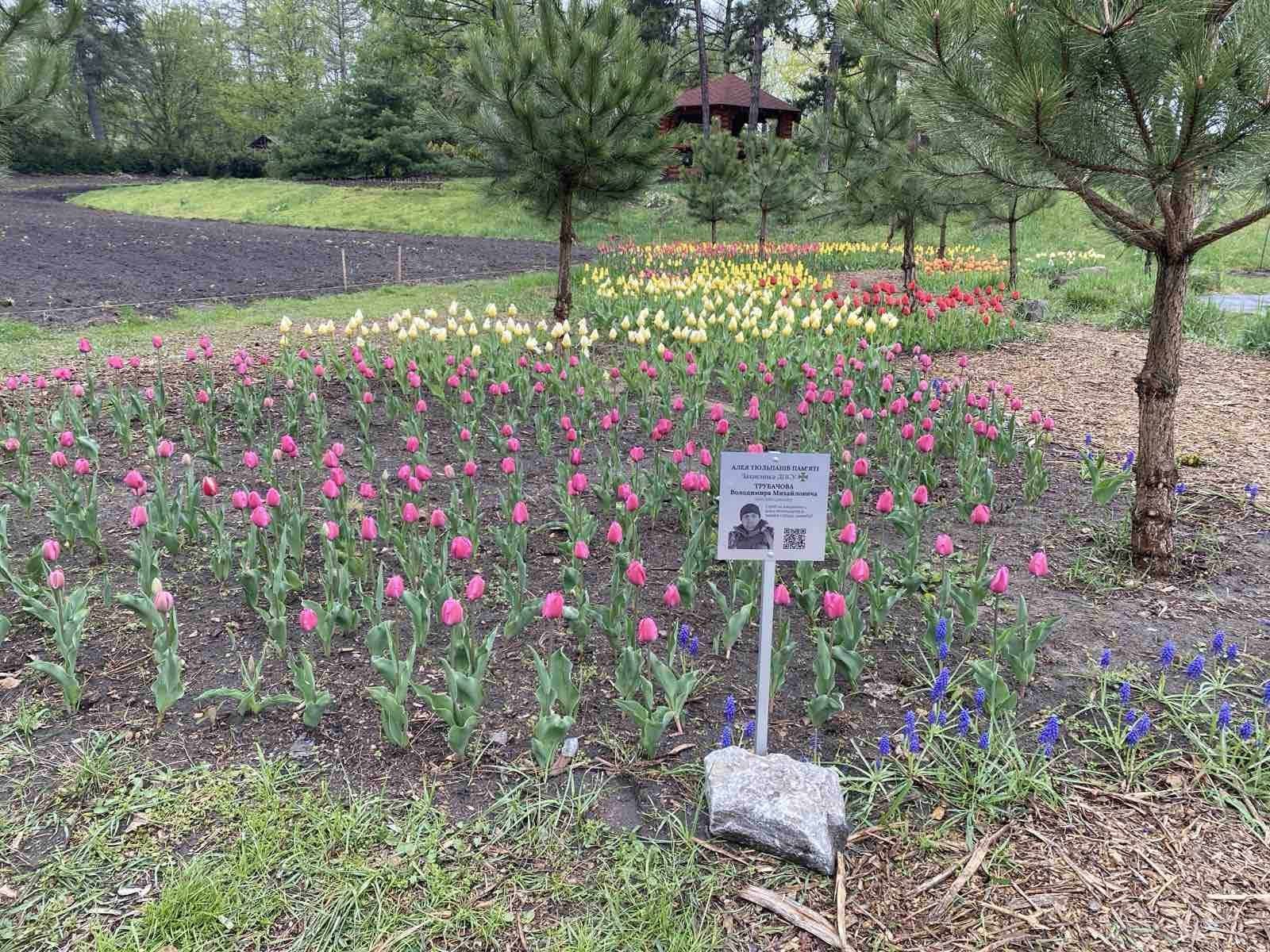
"I felt so warm that I did this for the joy of other families. We also planted a personalized tree and buried the key to Volodymyr's favorite garage under it. To be able to come to him with my children. I will run, paint pictures, give interviews, plant memory alleys, and travel to the East. All for his sake. Because as long as we remember, they live."
Svitlana plans to rebury her husband in Kyiv so that she can visit him more often.
"I'm like a root that was pulled out, but it doesn't take root anywhere. I really want to be close to my husband. He is buried in Dnipro, and I live in Kyiv. I want to take him to my place. This decision was not easy for me. I can't go there all the time, I want to be able to go to him for the holidays. September 15 is our family date. We got married on this day, got married, baptized our children, and I want to rebury him on September 15." (We spoke with Svitlana in early September. At the time of publication, she had already reburied her husband.)
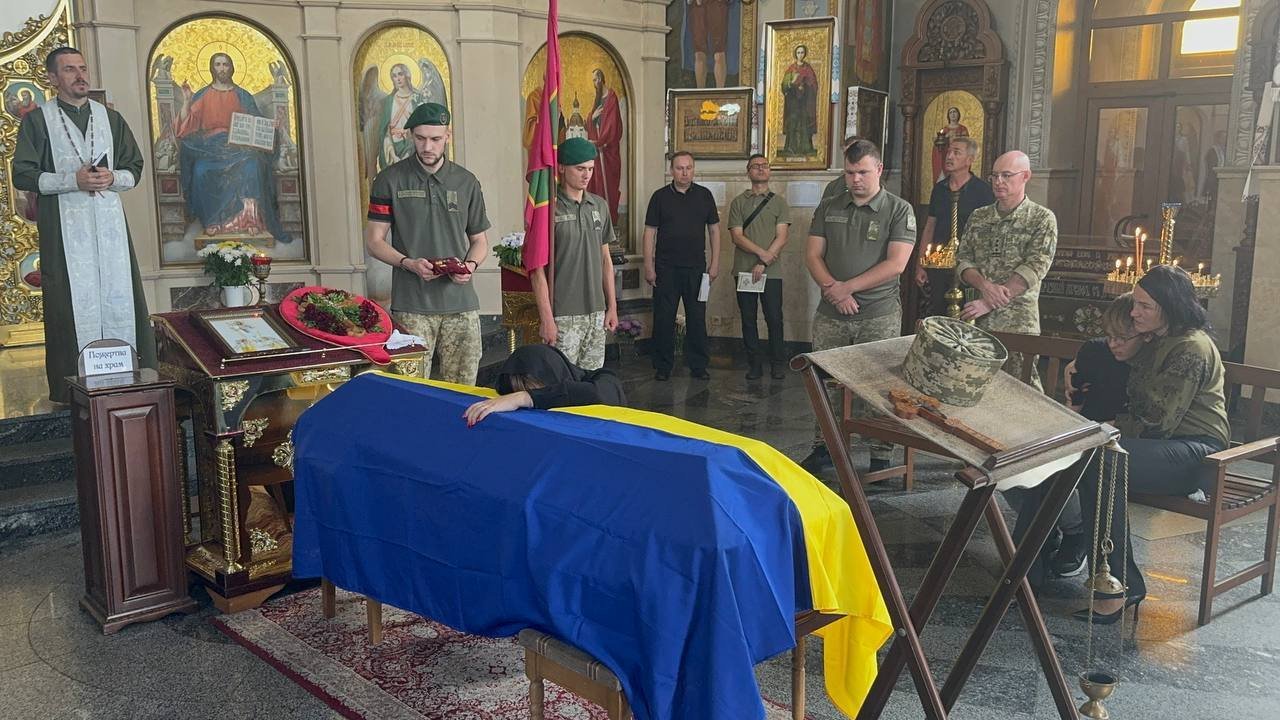
Svitlana also helps her husband's fellow soldiers. She raises money and buys drones. One day, she started gathering a group of people to donate blood and transfer the money for the donation to Mavic. Blood for blood, as they say. It turned out that many people were not suitable. Out of 10 people, there were 1-2 left. She was giving up. But she reassured herself that she was doing what she could, making every effort to ensure that as few women as possible felt the pain she had to go through.
"Mom, you're still running for Dad," Polinka reminds her, referring to the 'Running for a Hero' race on August 31.
And this is probably the most accurate brief description of Svitlana's life. She is constantly running in order to do everything she can.
"Maviks"
Polina goes to try on her mom's shiny, high-platform sandals. Her mother runs to cook buckwheat because the lights have just been turned on and to pack her things because in the morning, she has to take those paper bags with Mavicas to the boys in the East.
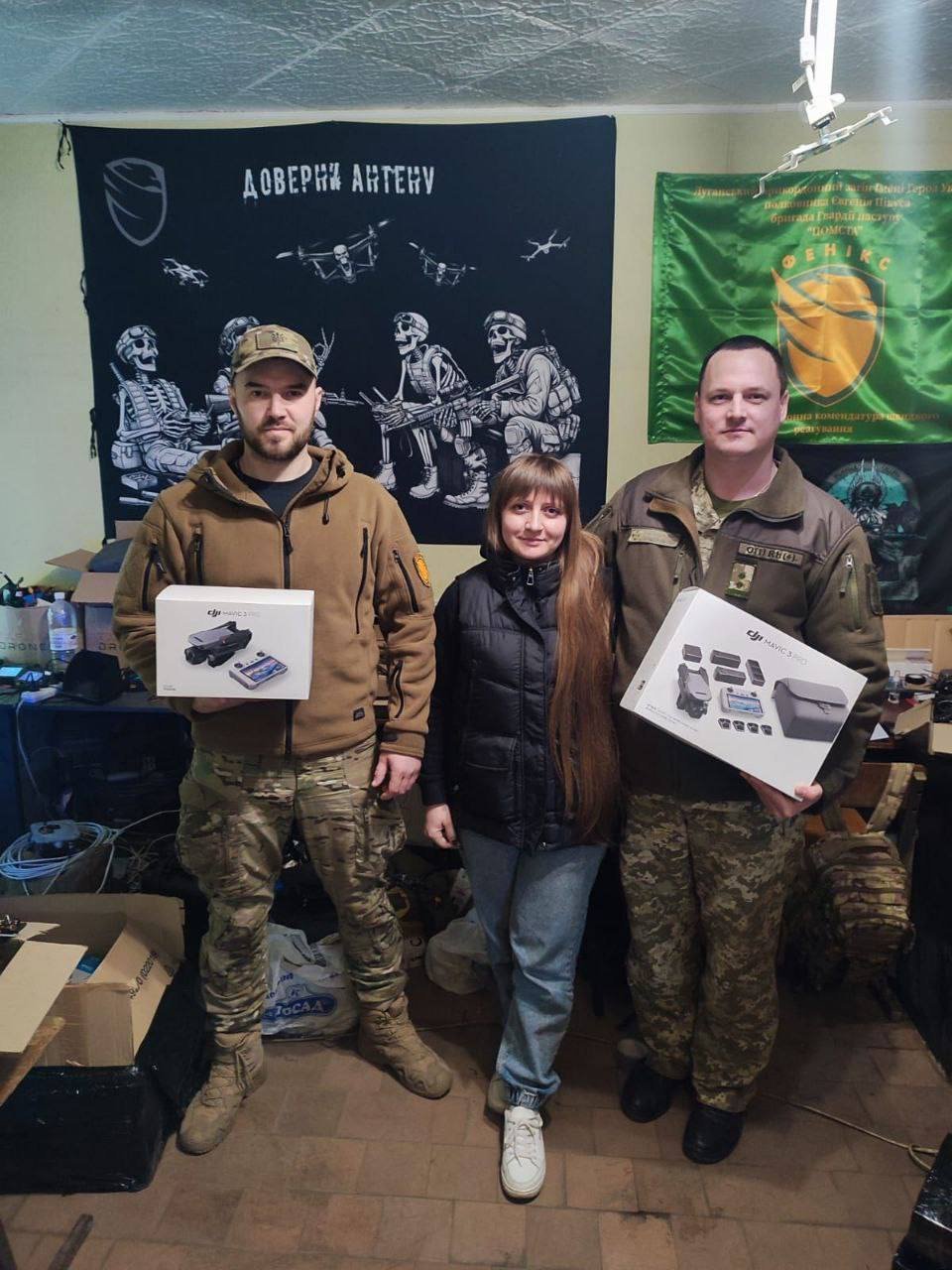
"I'm going home to Donbas," she says," I can't even breathe there. This is my land, and my heart breaks when I see no life there anymore. If the guys take this land away, there will be almost no houses there, and the fields will have "mined" signs instead of crops. I don't know how many years it will take to clear all that. It will be a second Chornobyl. But as long as I have the opportunity, I want to go there, I want to see those exhausted, tortured eyes that are ready to fight to the end. I don't know what could be better than communicating with people protecting you, your children, your city."
You can help Svitlana raise funds for the next Mavic by donating any amount to the bank via the link.

